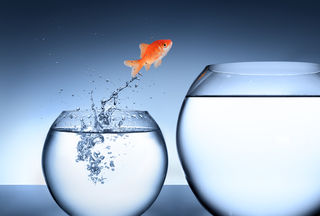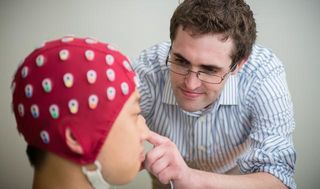Growth Mindset
Self-Compassion, Growth Mindset, and the Benefits of Failure
Learning from your mistakes combined with self-compassion is a winning formula.
Posted January 30, 2017

Two different psychological studies were published today that illuminate the importance of various age students practicing self-compassion and adopting a "growth mindset" (a term coined by Carol Dweck of Stanford University) marked by a self-belief that your intelligence is malleable and never set in stone.
The first study, from the University of British Columbia, "Don't be so hard on yourself! Changes in self-compassion during the first year of university are associated with changes in well-being," was published today in the journal Personality and Individual Differences.
The second study, from Michigan State University, "Neural evidence for enhanced attention to mistakes among school-aged children with a growth mindset," was published online today in Developmental Cognitive Neuroscience.
Self-Compassion May Be Key to Thriving During Freshman Year
Researchers at UBC recently found that students who reported higher levels of self-compassion also tended to feel more optimistic, energetic, and alive during their first semester of college. In fact, a student's self-reported self-compassion levels rose in tandem with his or her overall motivation and engagement.
The researchers emphasize that self-compassion should incorporate self-acceptance, -forgiveness, and -kindness. Not only does this mean avoiding excessive self-criticism ... self-compassion also includes recognizing that failure is an inherent part of the learning process in academics, sports, and just about every other pursuit in life.
As Ellen DeGeneres once said, "It's failure that gives you the proper perspective on success. When you take risks, you learn that there will be times when you succeed and there will be times when you fail. Both are equally important."
DeGeneres' anecdotal words of wisdom corroborate the April 2016 research findings by Carol Dweck and psychological scientist Kyla Haimovitz of Stanford University.
In their study, "What Predicts Childrens Fixed and Growth Intelligence Mind-Sets? Not Their Parents Views of Intelligence but Their Parents Views of Failure," Haimovitz and Dweck report that children who are encouraged to view failure as an opportunity for growth faired much better than children who had parents who reinforced the notion that failure is always 'bad.'
People with a growth mindset believe that intelligence is malleable, expandable, and never fixed. They also believe that you can learn and grow from mistakes or setbacks.
Failure and success are two sides of the same coin, as summed up in the sage advice of Winston Churchill: “Success consists of going from failure to failure without losing enthusiasm.” (For the record, this has been my mantra for eons; as both a quixotic ultra-endurance athlete and fledgling writer who has endured countless amounts of failure and naysayers throughout my lifespan along with a few spatterings of success.)
Dweck's previous research found that growth mindset also boosts resilience, positive emotions, and someone's ability to bounce back quickly from the agony of defeat. With practice, a growth mindset helps you let go of failure's disappointment and move on to new challenges.
On the flip side, those with a "fixed mindset"—who believe that their intelligence and abilities are less fluid—tend to beat themselves up and get stuck, by dwelling on failures. A fixed mindset is also linked to a lack of self-compassion, in which failure can create a demotivating downward spiral of hopelessness and low self-esteem.
In the TED lecture below, "The Power of Believing That You Can Improve," Carol Dweck drives home the importance of believing that mindset is never fixed and that intelligence is malleable throughout our lives.
Haimovitz and Dweck hope their findings will help reinforce the importance of putting the benefits of failure in the spotlight. This is especially important for parents of younger children when teaching kids how to respond to setbacks in ways that are encouraging rather than discouraging. Nourishing a growth mindset can give youngsters a set of coping skills that could last a lifetime. (To read more on this study, check out my Psychology Today blog post, "The No. 1 Reason You Should Never Be Afraid to Try")
In a statement to UBC, Katie Gunnell, the new self-compassion study's lead author and a junior research scientist at Children's Hospital of Eastern Ontario Research Institute in Ottawa, said,
"Our study suggests the psychological stress students may experience during the transition between high school and university can be mitigated with self-compassion because it enhances the psychological needs of autonomy, competence, and relatedness, which in turn, enriches well-being."
Peter Crocker, co-author and UBC kinesiology professor previously discovered that self-compassion interventions designed to lower self-criticism and negative ruminations improved performance in college athletes. He said of their latest research on self-compassion in college freshmen,
"Students who are used to getting high grades may be shocked to not do as well in university, feel challenged living away from home, and are often missing important social support they had in high school. Self-compassion appears to be an effective strategy or resource to cope with these types of issues."
Hopefully, this recent research will galvanize colleges and universities to create various workshops and campaigns that promote self-compassion and teach students to embrace the underestimated benefits of failure.
Learning From Mistakes and Growth Mindset Go Hand in Hand

The latest MSU research from Jason Moser’s Clinical Psychophysiology Lab on the benefits of a growth mindset and the importance of being open to learning from one's mistakes measured young participants' brain waves as they learned. This study was led by Hans Schroder, who is a fifth-year doctoral student in MSU's Department of Psychology.
For this study, Schroder and colleagues started by assessing 123 children with an average age of 7-years-old to establish two cohorts: One group was tagged as having a growth mindset, the other with a fixed mindset.
Then, the researchers monitored participant's brain waves using an EEG as the children played a fast-moving accuracy computer game (designed to prompt mistakes) while their brain wave activity was recorded.
Within half-of-a-second of making a mistake, brain activity spiked to varying degrees as each player tried to pinpoint exactly what had gone wrong. The more pronounced the brain response, the more the person was focused on trying to figure out his or her mistake.
As would be expected, children with growth mindsets were more likely to have robust brain responses after making a mistake than their fixed mindset counterparts. They were also more likely to improve on the accuracy tasks the longer they played the game.
In a statement to MSU, Schroder said,"The main implication here is that we should pay close attention to our mistakes and use them as opportunities to learn."
In many ways, the MSU researcher's 2017 brain wave findings reaffirm Haimovitz and Dweck's 2016 findings from their benefits of failure study.
Schroder et al. encourage teachers and parents to help children learn to pay more attention to their mistakes in a way that opens up growth mindset opportunities. Glossing over mistakes or shying away from a constructive dialogue about the importance of short-term failure as a pathway to long-term success can undermine someone's potential growth.
"I have not failed. I've just found 10,000 ways that won't work." — Thomas Edison
Nikki Giovanni (born 1943), world-renowned African-American writer, poet, and social commentator, once said:
"I really don’t think life is about the I-could-have-beens. Life is only about the I-tried-to-do. I don’t mind the failure, but I can’t imagine that I’d forgive myself if I didn’t try.”
Hopefully, the empirical and anecdotal evidence presented herein will inspire anyone reading this to increase your own growth mindset (and that of your children, if you're a parent) along with nourishing your self-compassion and embracing all the silver-linings of failure at every stage of life—as you push against your limits day in and day out.
References
Hans S. Schroder, Megan E. Fisher, Yanli Lin, Sharon L. Lo, Judith H. Danovitch, Jason S. Moser. Neural evidence for enhanced attention to mistakes among school-aged children with a growth mindset. Developmental Cognitive Neuroscience, 2017; 24: 42 DOI: 10.1016/j.dcn.2017.01.004
Katie E. Gunnell, Amber D. Mosewich, Carolyn E. McEwen, Robert C. Eklund, Peter R.E. Crocker. Don't be so hard on yourself! Changes in self-compassion during the first year of university are associated with changes in well-being. Personality and Individual Differences, 2017; 107: 43 DOI: 10.1016/j.paid.2016.11.032
K. Haimovitz, C. S. Dweck. What Predicts Childrens Fixed and Growth Intelligence Mind-Sets? Not Their Parents Views of Intelligence but Their Parents Views of Failure. Psychological Science, 2016; DOI: 10.1177/0956797616639727




